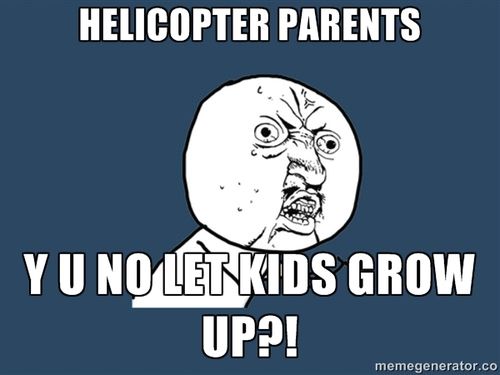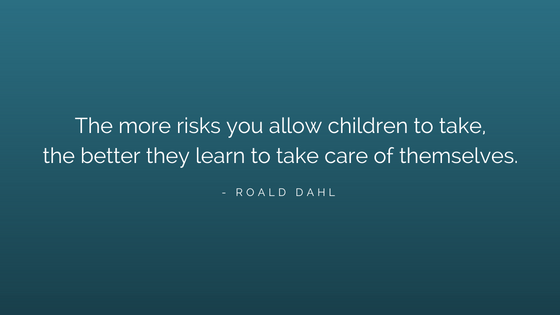What are the skills that every young person needs?
How can adults (parents, teachers, mentors, etc.) help young people to learn the necessary skills for success in life? While it's true that young people need the care and support from the adults in their life, adults sometimes tend to over-protect their children, to the extent that there is now a meme known as "helicopter parents", which is related to tiger moms, or soccer dads, who are afraid of letting their kids make mistakes.
This parenting style, characterized by a helicopter-like tendency to hover over children (and even teenagers) and swoop in to rescue them at the first sign of trouble, exploded into mainstream consciousness in the early 2000s, just as the oldest millennials were entering young adulthood. This was a time in the culture that was fraught with peril, after events like Sept. 11 and the two economic crashes of 2000 and 2008, where parents had cause for concern over their children's futures.
The worst examples of helicopter parenting include previously unheard-of behaviors like parents attending their adult children's job interviews or calling college professors to argue over a grade. Meanwhile kids emerge from childhood without basic survival skills like how to cook, or clean, or do their own laundry.

While it's true that these parental characteristics generally come from the highly educated middle class or wealthier families with social and financial resources to share with adult children, it's also true that this is an ongoing set of circumstances that may come from many different economic and social backgrounds and that may need to be examined in more detail, if adults are to understand that their over-protectiveness may be stunting the development of young people as they grow into adulthood.
- A young person must be able to handle interpersonal problems.
What adults might be doing wrong in these situations is to step in to solve misunderstandings and soothe hurt feelings for them; so, young people don't know how to cope with problems and resolve conflicts without adult intervention. - A young person must be able to cope with ups and downs of courses and workloads, college-level work, tough teachers, bosses, and competition from others.
What adults might be doing wrong in these situations is to step in when things get hard, finish the task, extend the deadline, or attempt to intervene and talk to the adults; so young people don't know that in the normal course of life things won't always go their way, and that they'll be okay regardless. - A young person must be able to take risks.
What adults might be doing wrong in these situations is to lay out the entire path for a young person to take and attempt to avoid all pitfalls or prevent all stumbles for them; so young people don't develop the wise understanding that success comes only after trying and failing and trying again, or that resilience only comes from coping when things have gone wrong. - A young person must be able to manage their assignments, deadlines, and workload.
What adults might be doing wrong in these situations is to remind young people when their homework is due and when to do it, sometimes even attempt to help them do it or do it for them; so young people don't know how to prioritize tasks, meet deadlines, or manage workloads, without regular prompting and reminders. - A young person must be able to earn and manage money.
What adults might be doing wrong in these situations is to provide money for whatever young people want or need, rather than teach them to hold down part-time jobs; so young people don't develop a sense of responsibility for completing job tasks, accountability to a boss who doesn't inherently love them, or an appreciation for the cost of things and how to manage their finances. - A young person must be able to contribute to the necessities of running a household.
What adults might be doing wrong in these situations is to fail to ask young people to help around the house, so young people don't know how to look after their own needs, respect the needs of other members of the household, or do their fair share for the good of the whole household. - A young person must be able to find their way around a campus, the neighborhood in which their summer internship is located, or the city where they are studying or working abroad.
What adults might be doing wrong in these situations is to drive or accompany young people everywhere, even when a bicycle, their feet, or a bus could get them there; so young people don't know the route for getting from here to there, how to cope with transportation options and problems caused by transportation failures, or how to make and execute plans for transportation. - A young person must be able to communicate with strangers whether they be faculty, advisers, deans, human resource managers, coworkers, store clerks, bank tellers, landlords, health care providers, bus drivers, mechanics, or people that they might need to approach out on the street.
What adults might be doing wrong in these situations is to teach young people not to talk to strangers instead of teaching the more nuanced skills of how to discern the few bad strangers from the mostly good strangers. So, young people end up not knowing how to approach strangers with respect and eye contact, for the help, guidance and direction that they need out in the real world.

Melissa
After reading this article I can relate to this because I have a "Helicopter parent" which is my mother. So I would agree with most of the main points. I do think that it's true for a young person to develop skills of their own without their parents help so they could be independent. For example I do believe that young people should be able to handle their own problems and cope with their ups and downs. I also think it is very important for young people to develop the skills of not having your parent(s) do everything for you and learn to do it themselves or they won't develop the self going, hard work aspect. I also strongly agree that young people should be able to do some work around the household without the parent(s) asking them or reminding them to. I can say I strongly agree because personally I have been getting myself to do my chores around my house without my mom telling me or reminding me.
Reading further on I would agree and not agree with the topic of A young person being able to communicate with strangers. I do think it is very important for young people to show respect and eye contact but young people have to be aware of the strangers out there in the world. Young people just can't walk up to a stranger and talk to them it's dangerous but however if it's a co- worker, store clerk and etc they should be ale to show respect and eye contact.
Overall I do think that most parents like to do everything for their child and I can understand that. However personally my thought is that young people especially teens and approaching teens need to learn life skills without their parents watching them and even doing everything for them.
reply